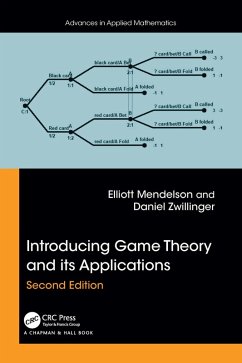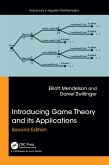66,95 €
66,95 €
inkl. MwSt.
Sofort per Download lieferbar

33 °P sammeln
66,95 €
Als Download kaufen

66,95 €
inkl. MwSt.
Sofort per Download lieferbar

33 °P sammeln
Jetzt verschenken
Alle Infos zum eBook verschenken
66,95 €
inkl. MwSt.
Sofort per Download lieferbar
Alle Infos zum eBook verschenken

33 °P sammeln
- Format: PDF
- Merkliste
- Auf die Merkliste
- Bewerten Bewerten
- Teilen
- Produkt teilen
- Produkterinnerung
- Produkterinnerung

Bitte loggen Sie sich zunächst in Ihr Kundenkonto ein oder registrieren Sie sich bei
bücher.de, um das eBook-Abo tolino select nutzen zu können.
Hier können Sie sich einloggen
Hier können Sie sich einloggen
Sie sind bereits eingeloggt. Klicken Sie auf 2. tolino select Abo, um fortzufahren.

Bitte loggen Sie sich zunächst in Ihr Kundenkonto ein oder registrieren Sie sich bei bücher.de, um das eBook-Abo tolino select nutzen zu können.
Introducing Game Theory and its Applications presents an easy-to-read introduction to the basic ideas and techniques of game theory.
- Geräte: PC
- mit Kopierschutz
- eBook Hilfe
Andere Kunden interessierten sich auch für
![Introducing Game Theory and its Applications (eBook, ePUB) Introducing Game Theory and its Applications (eBook, ePUB)]() Elliott MendelsonIntroducing Game Theory and its Applications (eBook, ePUB)66,95 €
Elliott MendelsonIntroducing Game Theory and its Applications (eBook, ePUB)66,95 €![Mathematics of Tabletop Games (eBook, PDF) Mathematics of Tabletop Games (eBook, PDF)]() Aaron MontgomeryMathematics of Tabletop Games (eBook, PDF)26,95 €
Aaron MontgomeryMathematics of Tabletop Games (eBook, PDF)26,95 €![Game Theory (eBook, PDF) Game Theory (eBook, PDF)]() Richard Alan GillmanGame Theory (eBook, PDF)48,95 €
Richard Alan GillmanGame Theory (eBook, PDF)48,95 €![Mathematicians Playing Games (eBook, PDF) Mathematicians Playing Games (eBook, PDF)]() Jon-Lark KimMathematicians Playing Games (eBook, PDF)26,95 €
Jon-Lark KimMathematicians Playing Games (eBook, PDF)26,95 €![Basics of Ramsey Theory (eBook, PDF) Basics of Ramsey Theory (eBook, PDF)]() Veselin JungicBasics of Ramsey Theory (eBook, PDF)103,95 €
Veselin JungicBasics of Ramsey Theory (eBook, PDF)103,95 €![Topics in Graph Theory (eBook, PDF) Topics in Graph Theory (eBook, PDF)]() Jonathan L GrossTopics in Graph Theory (eBook, PDF)85,95 €
Jonathan L GrossTopics in Graph Theory (eBook, PDF)85,95 €![Graphs & Digraphs (eBook, PDF) Graphs & Digraphs (eBook, PDF)]() Gary ChartrandGraphs & Digraphs (eBook, PDF)60,95 €
Gary ChartrandGraphs & Digraphs (eBook, PDF)60,95 €-
-
-
Introducing Game Theory and its Applications presents an easy-to-read introduction to the basic ideas and techniques of game theory.
Hinweis: Dieser Artikel kann nur an eine deutsche Lieferadresse ausgeliefert werden.
Dieser Download kann aus rechtlichen Gründen nur mit Rechnungsadresse in A, B, BG, CY, CZ, D, DK, EW, E, FIN, F, GR, HR, H, IRL, I, LT, L, LR, M, NL, PL, P, R, S, SLO, SK ausgeliefert werden.
Hinweis: Dieser Artikel kann nur an eine deutsche Lieferadresse ausgeliefert werden.
Produktdetails
- Produktdetails
- Verlag: Taylor & Francis eBooks
- Seitenzahl: 287
- Erscheinungstermin: 2. August 2024
- Englisch
- ISBN-13: 9781040091852
- Artikelnr.: 72284350
- Verlag: Taylor & Francis eBooks
- Seitenzahl: 287
- Erscheinungstermin: 2. August 2024
- Englisch
- ISBN-13: 9781040091852
- Artikelnr.: 72284350
- Herstellerkennzeichnung Die Herstellerinformationen sind derzeit nicht verfügbar.
Elliott Mendelson is the late professor emeritus at Queens College in Flushing, New York, USA. Dr. Mendelson obtained his bachelor's at Columbia University and his master's and doctoral degrees at Cornell University and was elected afterward to the Harvard Society of Fellows. In addition to his other writings, he is the author of another CRC Press book, Introduction to Mathematical Logic, Sixth Edition.
Dan Zwillinger has more than 35 years of proven technical expertise in numerous areas of engineering and the physical sciences. He earned a PhD in applied mathematics from the California Institute of Technology. He is the editor of CRC Standard Mathematical Tables and Formulas, 33rd Edition and also Table of Integrals, Series, and Products, by Gradshteyn and Ryzhik. He serves as the series editor of the CRC Series of Advances in Applied Mathematics.
Dan Zwillinger has more than 35 years of proven technical expertise in numerous areas of engineering and the physical sciences. He earned a PhD in applied mathematics from the California Institute of Technology. He is the editor of CRC Standard Mathematical Tables and Formulas, 33rd Edition and also Table of Integrals, Series, and Products, by Gradshteyn and Ryzhik. He serves as the series editor of the CRC Series of Advances in Applied Mathematics.
Introduction. Combinatorial Games. Two
Person Zero
Sum Games. The Simplex Method. The Fundamental Theorem of Duality. Solution of Two
Person Zero
Sum Games. Non
Zero
Sum Games and k
Person Games. Appendices: Finite Probability Theory. Utility Theory. Nash's Theorem. Answers to Selected Exercises. Bibliography.
Person Zero
Sum Games. The Simplex Method. The Fundamental Theorem of Duality. Solution of Two
Person Zero
Sum Games. Non
Zero
Sum Games and k
Person Games. Appendices: Finite Probability Theory. Utility Theory. Nash's Theorem. Answers to Selected Exercises. Bibliography.
Preface
Introduction
1 Combinatorial games
1.1 Definition of combinatorial games
1.2 Fundamental theorem of combinatorial games
1.3 Nim
1.4 Hex and other games
1.5 Tree games
1.6 Grundy functions
1.7 Bogus Nim-sums
1.8 Chapter summary
2 Two-person zero-sum games
2.1 Games in normal form
2.2 Saddle points and equilibrium pairs
2.3 Maximin and minimax
2.4 Mixed strategies
2.5 2-by-2 matrix games
2.6 2-by-n, m-by-2 and 3-by-3 matrix games
2.7 Linear programming
2.8 Chapter summary
3 Solving two-person zero-sum games using LP
3.1 Perfect canonical linear programming problems
3.2 The simplex method
3.3 Pivoting
3.4 The perfect phase of the simplex method
3.5 The Big M method
3.6 Bland's rules to prevent cycling
3.7 Duality and the simplex method
3.8 Solution of game matrices
3.9 Chapter summary
4 Non-zero-sum games and k-person games
4.1 The general setting
4.2 Nash equilibria
4.3 Graphical method for 2 Ã- 2 matrix games
4.4 Inadequacies of Nash equilibria & cooperative games
4.5 The Nash arbitration procedure
4.6 Games with two or more players
4.7 Coalitions
4.8 Games in coalition form
4.9 The Shapley value
4.10 The Banzhaf power index
4.11 Imputations
4.12 Strategic equivalence
4.13 Stable sets
4.14 Chapter summary
5 Imperfect Information Games
5.1 The general setting
5.2 Complete information games in extensive form
5.3 Imperfect information games in extensive form
5.4 Games with random effects
5.5 Chapter summary
6 Computer solutions to games
6.1 Zero-sum games - invertible matrices
6.2 Zero sum games - linear program problem (LP)
6.3 Special Linear Programming Capabilities
6.4 Non-zero sum games - linear complementarity problem (LCP)
6.5 Special game packages
6.6 Chapter summary
Appendices
Appendix A Utility theory
Appendix B Nash's theorem
Appendix C Finite probability theory
Appendix D Calculus & Differentiation
Appendix E Linear Algebra
Appendix F Linear Programming
Appendix G Named Games and Game Data
Answers to selected exercises
Bibliography
Index
Introduction
1 Combinatorial games
1.1 Definition of combinatorial games
1.2 Fundamental theorem of combinatorial games
1.3 Nim
1.4 Hex and other games
1.5 Tree games
1.6 Grundy functions
1.7 Bogus Nim-sums
1.8 Chapter summary
2 Two-person zero-sum games
2.1 Games in normal form
2.2 Saddle points and equilibrium pairs
2.3 Maximin and minimax
2.4 Mixed strategies
2.5 2-by-2 matrix games
2.6 2-by-n, m-by-2 and 3-by-3 matrix games
2.7 Linear programming
2.8 Chapter summary
3 Solving two-person zero-sum games using LP
3.1 Perfect canonical linear programming problems
3.2 The simplex method
3.3 Pivoting
3.4 The perfect phase of the simplex method
3.5 The Big M method
3.6 Bland's rules to prevent cycling
3.7 Duality and the simplex method
3.8 Solution of game matrices
3.9 Chapter summary
4 Non-zero-sum games and k-person games
4.1 The general setting
4.2 Nash equilibria
4.3 Graphical method for 2 Ã- 2 matrix games
4.4 Inadequacies of Nash equilibria & cooperative games
4.5 The Nash arbitration procedure
4.6 Games with two or more players
4.7 Coalitions
4.8 Games in coalition form
4.9 The Shapley value
4.10 The Banzhaf power index
4.11 Imputations
4.12 Strategic equivalence
4.13 Stable sets
4.14 Chapter summary
5 Imperfect Information Games
5.1 The general setting
5.2 Complete information games in extensive form
5.3 Imperfect information games in extensive form
5.4 Games with random effects
5.5 Chapter summary
6 Computer solutions to games
6.1 Zero-sum games - invertible matrices
6.2 Zero sum games - linear program problem (LP)
6.3 Special Linear Programming Capabilities
6.4 Non-zero sum games - linear complementarity problem (LCP)
6.5 Special game packages
6.6 Chapter summary
Appendices
Appendix A Utility theory
Appendix B Nash's theorem
Appendix C Finite probability theory
Appendix D Calculus & Differentiation
Appendix E Linear Algebra
Appendix F Linear Programming
Appendix G Named Games and Game Data
Answers to selected exercises
Bibliography
Index
Introduction. Combinatorial Games. Two
Person Zero
Sum Games. The Simplex Method. The Fundamental Theorem of Duality. Solution of Two
Person Zero
Sum Games. Non
Zero
Sum Games and k
Person Games. Appendices: Finite Probability Theory. Utility Theory. Nash's Theorem. Answers to Selected Exercises. Bibliography.
Person Zero
Sum Games. The Simplex Method. The Fundamental Theorem of Duality. Solution of Two
Person Zero
Sum Games. Non
Zero
Sum Games and k
Person Games. Appendices: Finite Probability Theory. Utility Theory. Nash's Theorem. Answers to Selected Exercises. Bibliography.
Preface
Introduction
1 Combinatorial games
1.1 Definition of combinatorial games
1.2 Fundamental theorem of combinatorial games
1.3 Nim
1.4 Hex and other games
1.5 Tree games
1.6 Grundy functions
1.7 Bogus Nim-sums
1.8 Chapter summary
2 Two-person zero-sum games
2.1 Games in normal form
2.2 Saddle points and equilibrium pairs
2.3 Maximin and minimax
2.4 Mixed strategies
2.5 2-by-2 matrix games
2.6 2-by-n, m-by-2 and 3-by-3 matrix games
2.7 Linear programming
2.8 Chapter summary
3 Solving two-person zero-sum games using LP
3.1 Perfect canonical linear programming problems
3.2 The simplex method
3.3 Pivoting
3.4 The perfect phase of the simplex method
3.5 The Big M method
3.6 Bland's rules to prevent cycling
3.7 Duality and the simplex method
3.8 Solution of game matrices
3.9 Chapter summary
4 Non-zero-sum games and k-person games
4.1 The general setting
4.2 Nash equilibria
4.3 Graphical method for 2 Ã- 2 matrix games
4.4 Inadequacies of Nash equilibria & cooperative games
4.5 The Nash arbitration procedure
4.6 Games with two or more players
4.7 Coalitions
4.8 Games in coalition form
4.9 The Shapley value
4.10 The Banzhaf power index
4.11 Imputations
4.12 Strategic equivalence
4.13 Stable sets
4.14 Chapter summary
5 Imperfect Information Games
5.1 The general setting
5.2 Complete information games in extensive form
5.3 Imperfect information games in extensive form
5.4 Games with random effects
5.5 Chapter summary
6 Computer solutions to games
6.1 Zero-sum games - invertible matrices
6.2 Zero sum games - linear program problem (LP)
6.3 Special Linear Programming Capabilities
6.4 Non-zero sum games - linear complementarity problem (LCP)
6.5 Special game packages
6.6 Chapter summary
Appendices
Appendix A Utility theory
Appendix B Nash's theorem
Appendix C Finite probability theory
Appendix D Calculus & Differentiation
Appendix E Linear Algebra
Appendix F Linear Programming
Appendix G Named Games and Game Data
Answers to selected exercises
Bibliography
Index
Introduction
1 Combinatorial games
1.1 Definition of combinatorial games
1.2 Fundamental theorem of combinatorial games
1.3 Nim
1.4 Hex and other games
1.5 Tree games
1.6 Grundy functions
1.7 Bogus Nim-sums
1.8 Chapter summary
2 Two-person zero-sum games
2.1 Games in normal form
2.2 Saddle points and equilibrium pairs
2.3 Maximin and minimax
2.4 Mixed strategies
2.5 2-by-2 matrix games
2.6 2-by-n, m-by-2 and 3-by-3 matrix games
2.7 Linear programming
2.8 Chapter summary
3 Solving two-person zero-sum games using LP
3.1 Perfect canonical linear programming problems
3.2 The simplex method
3.3 Pivoting
3.4 The perfect phase of the simplex method
3.5 The Big M method
3.6 Bland's rules to prevent cycling
3.7 Duality and the simplex method
3.8 Solution of game matrices
3.9 Chapter summary
4 Non-zero-sum games and k-person games
4.1 The general setting
4.2 Nash equilibria
4.3 Graphical method for 2 Ã- 2 matrix games
4.4 Inadequacies of Nash equilibria & cooperative games
4.5 The Nash arbitration procedure
4.6 Games with two or more players
4.7 Coalitions
4.8 Games in coalition form
4.9 The Shapley value
4.10 The Banzhaf power index
4.11 Imputations
4.12 Strategic equivalence
4.13 Stable sets
4.14 Chapter summary
5 Imperfect Information Games
5.1 The general setting
5.2 Complete information games in extensive form
5.3 Imperfect information games in extensive form
5.4 Games with random effects
5.5 Chapter summary
6 Computer solutions to games
6.1 Zero-sum games - invertible matrices
6.2 Zero sum games - linear program problem (LP)
6.3 Special Linear Programming Capabilities
6.4 Non-zero sum games - linear complementarity problem (LCP)
6.5 Special game packages
6.6 Chapter summary
Appendices
Appendix A Utility theory
Appendix B Nash's theorem
Appendix C Finite probability theory
Appendix D Calculus & Differentiation
Appendix E Linear Algebra
Appendix F Linear Programming
Appendix G Named Games and Game Data
Answers to selected exercises
Bibliography
Index







